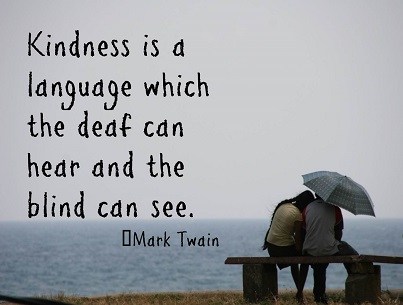Word-Of-the-Week #791: Benevolence
October 3, 2019 by Susan Clarke · Comments Off on Word-Of-the-Week #791: Benevolence
Benevolence – an act of kindness.
How would you rate yourself on being caring and helpful? When was the last time you received a random act of kindness? How did it make you feel?
This week features excerpts from the LA Times article by Teresa Watanabe “The Science of Kindness” is a great follow up to last weeks.“ A friendly smile. A food pantry donation. Or, a remarkable act of Los Angeles benevolence — allowing a driver to cut in front of you.
Such acts of kindness have a self-serving upside, too, as science has conclusively shown they also make you healthier.
Now UCLA is poised to advance that science with the Wednesday launch of the world’s first interdisciplinary research institute on kindness, which will explore, for instance, how and why being nice to others reduces depression and the risk of cancer and cardiovascular disease.
Research by UCLA scientists already has shown that mindfulness and kindness actually alter the behavior of genes, turning down those that promote inflammation, which can lead to heart disease or certain cancers, and turning up the activity of genes that protect against infections.
But the ultimate goal of the UCLA Bedari Kindness Institute is to spread kindness and promote a more humane world. “In the midst of current world politics, violence and strife, the UCLA Bedari Kindness Institute seeks to be an antidote,” said Darnell Hunt, dean of the UCLA division of social sciences, which will house the venture.
Researchers agreed on an academic definition for kindness: an act that enhances the welfare of others as an end in itself. When it comes to kindness, the intention, rather than the outcome, is key. In other words, it’s the thought that counts, as the adage goes.
Kindness is complimenting someone to make them feel good, not to get what you want. It’s sending a  donation to a charity even if the check gets lost in the mail. It’s contemplating a legitimate reason why a driver who cuts you off might be in a hurry.
donation to a charity even if the check gets lost in the mail. It’s contemplating a legitimate reason why a driver who cuts you off might be in a hurry.
“Cultivating kind thoughts increases the frequency of kind actions, and both the thoughts and the experience of engaging in the actions have positive effects on the well-being of the individual,” said Daniel Fessler, UCLA anthropology professor and the institute’s inaugural director.
Already, a range of UCLA researchers are studying the types of questions that will be the basis of the institute’s work, which will focus on three themes: the roots of kindness, how to promote it, and how to use it as a therapeutic intervention to improve mental and physical health.
Fessler said humans have come to dominate the globe, despite their relatively small size, because of their unparalleled ability to cooperate.
“As troubling as violence and cruelty are in our society, the actual level of positive cooperation is astounding at an evolutionary level,” he said. “Our species is a hyper-cooperative one. No other species is engaged in such a large level of cooperation among individuals who are not kin.”
But, he noted, humans also have a long history of violent inter-group conflict and cruelty. One researcher, UCLA sociologist Aliza Luft, is exploring cultural factors that not only promote cruelty but also lead some members of the dominant group to choose kindness instead — such as those “righteous Gentiles” who risked their lives to save Jews from Nazi persecution and the Holocaust.
UCLA researchers also have shown that kindness can significantly ease depression and anxiety. Michelle Craske, a professor of psychology, psychiatry and behavioral sciences, has demonstrated that patients who received compassion training to cultivate joy, gratitude, loving-kindness and generosity, and engaged in kind acts — offering to help coworkers on projects, for instance — significantly reduced their depression. The improved mental health lasted throughout the six months researchers followed the patients, she said.
“My end goal is to have a broad platform to promote empathy and help people think about kindness,” Harris said. “It is, in terms of the perpetuation of our species and the ability to live with each other and nature, critically important.”
This week’s focus is on benevolence. When was the last time you expressed kindness for a complete stranger? How did it make you feel? How willing are you help a co-worker or friend with a project?
I LOVE feedback! Join my Facebook community on my FUN-damentals Fan Page.

